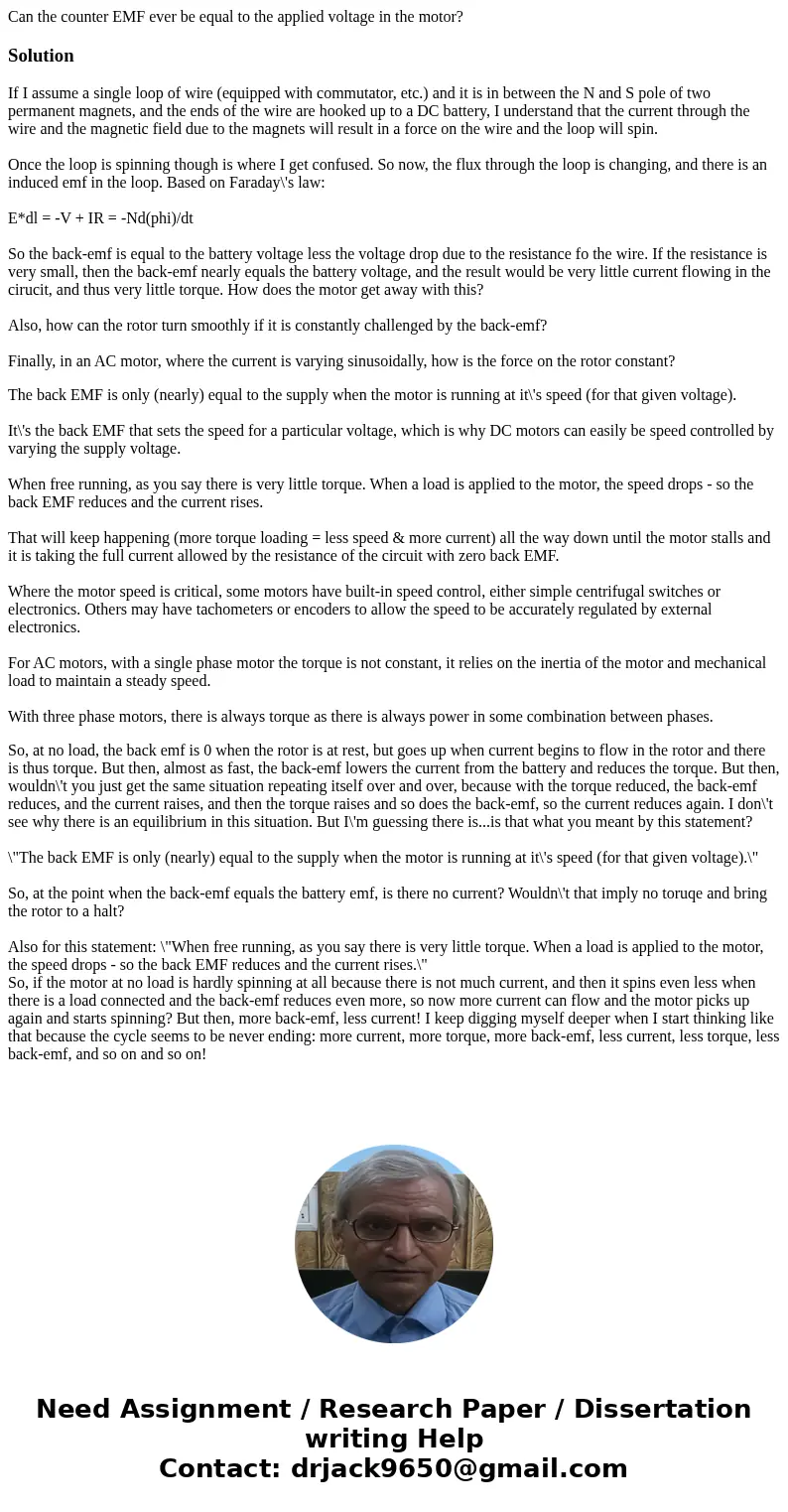Can the counter EMF ever be equal to the applied voltage in
Can the counter EMF ever be equal to the applied voltage in the motor?
Solution
If I assume a single loop of wire (equipped with commutator, etc.) and it is in between the N and S pole of two permanent magnets, and the ends of the wire are hooked up to a DC battery, I understand that the current through the wire and the magnetic field due to the magnets will result in a force on the wire and the loop will spin.
Once the loop is spinning though is where I get confused. So now, the flux through the loop is changing, and there is an induced emf in the loop. Based on Faraday\'s law:
E*dl = -V + IR = -Nd(phi)/dt
So the back-emf is equal to the battery voltage less the voltage drop due to the resistance fo the wire. If the resistance is very small, then the back-emf nearly equals the battery voltage, and the result would be very little current flowing in the cirucit, and thus very little torque. How does the motor get away with this?
Also, how can the rotor turn smoothly if it is constantly challenged by the back-emf?
Finally, in an AC motor, where the current is varying sinusoidally, how is the force on the rotor constant?
The back EMF is only (nearly) equal to the supply when the motor is running at it\'s speed (for that given voltage).
It\'s the back EMF that sets the speed for a particular voltage, which is why DC motors can easily be speed controlled by varying the supply voltage.
When free running, as you say there is very little torque. When a load is applied to the motor, the speed drops - so the back EMF reduces and the current rises.
That will keep happening (more torque loading = less speed & more current) all the way down until the motor stalls and it is taking the full current allowed by the resistance of the circuit with zero back EMF.
Where the motor speed is critical, some motors have built-in speed control, either simple centrifugal switches or electronics. Others may have tachometers or encoders to allow the speed to be accurately regulated by external electronics.
For AC motors, with a single phase motor the torque is not constant, it relies on the inertia of the motor and mechanical load to maintain a steady speed.
With three phase motors, there is always torque as there is always power in some combination between phases.
So, at no load, the back emf is 0 when the rotor is at rest, but goes up when current begins to flow in the rotor and there is thus torque. But then, almost as fast, the back-emf lowers the current from the battery and reduces the torque. But then, wouldn\'t you just get the same situation repeating itself over and over, because with the torque reduced, the back-emf reduces, and the current raises, and then the torque raises and so does the back-emf, so the current reduces again. I don\'t see why there is an equilibrium in this situation. But I\'m guessing there is...is that what you meant by this statement?
\"The back EMF is only (nearly) equal to the supply when the motor is running at it\'s speed (for that given voltage).\"
So, at the point when the back-emf equals the battery emf, is there no current? Wouldn\'t that imply no toruqe and bring the rotor to a halt?
Also for this statement: \"When free running, as you say there is very little torque. When a load is applied to the motor, the speed drops - so the back EMF reduces and the current rises.\"
So, if the motor at no load is hardly spinning at all because there is not much current, and then it spins even less when there is a load connected and the back-emf reduces even more, so now more current can flow and the motor picks up again and starts spinning? But then, more back-emf, less current! I keep digging myself deeper when I start thinking like that because the cycle seems to be never ending: more current, more torque, more back-emf, less current, less torque, less back-emf, and so on and so on!

 Homework Sourse
Homework Sourse